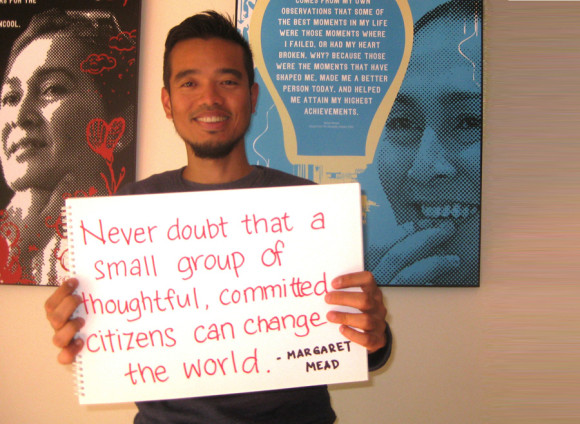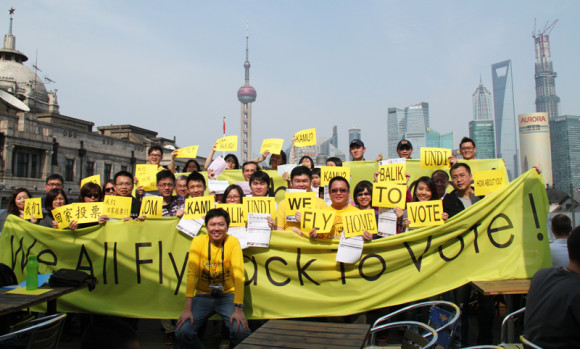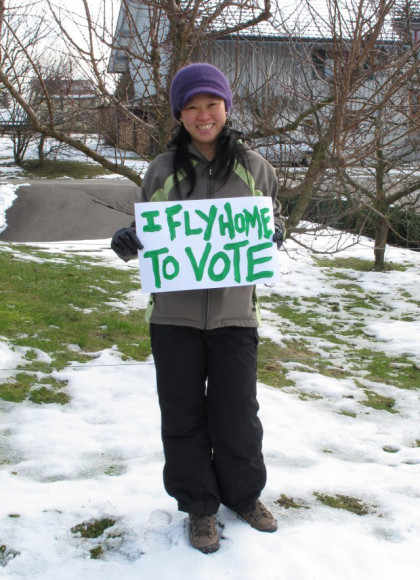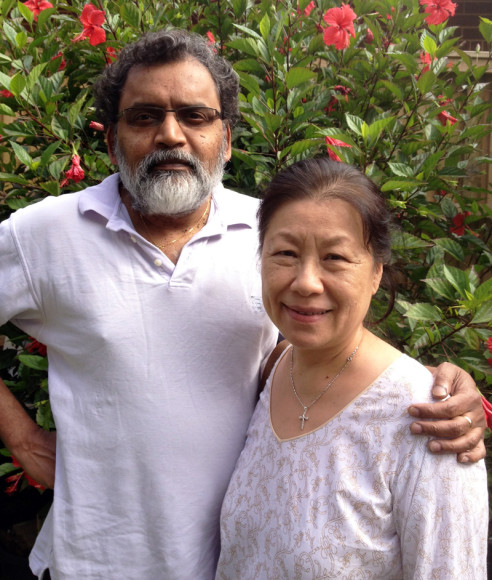FOR the first time since our independence, Malaysians living and working in different countries abroad have organised themselves strategically and collectively to return home to vote under the Jom Balik Undi (JBU) initiative. Launched in November 2011 as a social media initiative, the campaign has been encouraging Malaysians to go home and vote. Its purpose is “to help create a cleaner and brighter future for all Malaysians”.
Just who are these Malaysians who are running and participating in JBU? What sacrifices are the Malaysians who are returning home making in order to vote? And what is motivating them to spend money and time to make their choice known during the 13th general election (GE13) since our independence?

The inspiration of Bersih
Ostensibly, it was the Bersih movement for clean and fair elections that inspired some Malaysians living in Australia to organise overseas Malaysians for the upcoming GE13. Sydney-based art director Kevin Bathman, one of the media spokespersons for JBU, says the initiative was originally the idea of David Teoh. Teoh was a Global Bersih co-ordinator who used to reside in Melbourne and is now back in Malaysia.
By the time he left Australia, however, the campaign had not yet materialised. So, a few Sydney-based Malaysians took charge of it. “We saw successful social media campaigns like the (Barack) Obama election, the Arab Spring and the Israel Loves Iran initiative, and wanted to emulate something that would bring together Malaysian expatriates worldwide to show their support and solidarity towards Malaysians at home,” Bathman says in an e-mail interview.

Bathman cannot actually provide a figure of how many Malaysians are returning home under the JBU banner. That’s because JBU “only acts as a platform to inspire hope and show solidarity among Malaysians” [1].
However, if social media involvement is anything to go by, it would seem that the campaign has grabbed the attention of Malaysians living in countries near and far. These include Singapore, Brunei, Indonesia, Thailand, Myanmar, Australia, New Zealand, Japan, Taiwan, China, India, Saudi Arabia, Egypt, Afghanistan, the UK, Germany, the Netherlands, Spain, Switzerland, Norway, Luxembourg, the US and Canada.
In Singapore, 20 Malaysians who wanted to do something about GE13 carried placards in public to urge fellow Malaysians to return home to vote despite the threat of police action in the city state. Bersih Singapore also organised a car pool initiative and a subsidised coach service back to Malaysia for the polls.
At the same time, Bersih Shanghai announced on 15 April 2013 that many Malaysians residing in the most populated city in the world immediately booked their air tickets home when the polling date of 5 May was announced. The Shanghai campaign managed to raise about RM7,000, which has been used to subsidise the travel fare of 138 Malaysians.

Making a difference for change
It is highly likely that most, if not all, of the Malaysians participating in the JBU campaign are returning home to vote for change. Hui Mei Liew-Kaiser, 39, who is married to a German and who has lived in Switzerland since October 2010 says in an e-mail interview that she is flying home to vote because she wants a “healthy bipartisan political system”.
This system, she adds, would encourage check and balance and “ensure transparency and accountability”. A financial investment adviser, she says, without missing a beat: “Pocket lubang pun mesti balik undi.”

Indeed, Liew-Kaiser has had to buy two tickets home. She returned for Chinese New Year and spent two months waiting for the elections to be called. Parliament was dissolved on the day she landed back in Zurich. Once the Election Commission (EC) announced 5 May as polling day, she immediately booked her second ticket back home for the polls.
She is not the only one determined to do something to bring about change. Azmi Sabran, 39, an inspection engineer in the Singapore oil and gas industry, says: “This is the best election to show people power and we cannot tolerate the level of corruption in the government anymore.”
Azmi, who lives in Johor Baru and commutes to Singapore to work, will be voting in the Hulu Langat constituency in Selangor. Although not returning from overseas, he is still committed to supporting the JBU campaign. “I am encouraging Malaysians in Singapore to go back to their respective hometowns to cast their vote,” he says via e-mail.
For Sydney-based William de Cruz, 55, who is already back home, this is the first time he will be voting. He says he left Malaysia 22 years ago and still feels the pain of that decision. “This is my way of putting something back. The cost is really very little, in terms of what I can do as a citizen,” he says by e-mail, adding that “this is the most important thing I have ever done for Malaysia”. His wife, Helen Heng, will arrive in early May to cast her vote and then return quickly to work in Sydney.
De Cruz, a journalist-cum-musician, is one of the Bersih Sydney activists who helped develop JBU into the social media platform it is today. “JBU is a collective message of hope. Every one of us who is flying back to vote is helping to carry the hope of generations,” he says.
The EC

De Cruz says one of the reasons he is choosing to fly home to vote is because he is unhappy with the EC’s postal voting system. “We wanted a postal voting system that meets universal standards of democratic legitimacy. The system does not provide that. Every vote must count, and I’d rather not trouble a very reluctant EC to properly do something that is so important to me,” he explains.
More troubling is the lack of public confidence in the EC as expressed by Bersih Shanghai in its press release. Bersih Shanghai said it was disappointed that the EC would not count the postal votes at the overseas polling stations. It expressed fear that these postal votes would be replaced en route to Malaysia to be counted.
Overseas postal voters are to cast their vote on 28 April while Malaysians at home will vote on 5 May.
This distrust is compounded by the fact that there have been several instances where voters have been registered without their consent or knowledge. And in the case of Malaysians in Shanghai, some have been registered as absentee voters “without application, consent or knowledge”.
Bathman says that those behind JBU are working voluntarily with no payment. “Everything we do is to keep advancing the objectives of the Bersih movement,” he says, adding that JBU has not received any support or funding from any organisation.
At this juncture, it would be hard to measure the impact that JBU and returning Malaysians will have on GE13. “Time will tell,” Bathman reckons. In the meantime, JBU has, at the very least, given Malaysians abroad an avenue to voice their concerns and ask questions about the electoral system.
And, for that reason alone, it has united overseas Malaysians over a common — and some would say patriotic — cause. “Before this,” Bathman says, “the Malaysian diaspora didn’t have a concrete purpose to come together.” Now, with Malaysians “fed up and angry with the current government”, they do. ![]()
[1] JBU has since, together with Pusat Komas and Focus on Sarawak, launched Jom Balik Undi Bah, a global PayPal-based donation drive to help sponsor registered voters in Sabah and Sarawak return to their hometowns to vote. Both Borneo states are seen as crucial to garnering votes for the opposition.


Oversea Voter says
I am an overseas Malaysian. I am quite happy with BN. Like Michelle Yeoh. I will be voting BN tomorrow. Some overseas Malaysians doth protest too much.